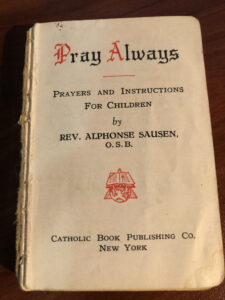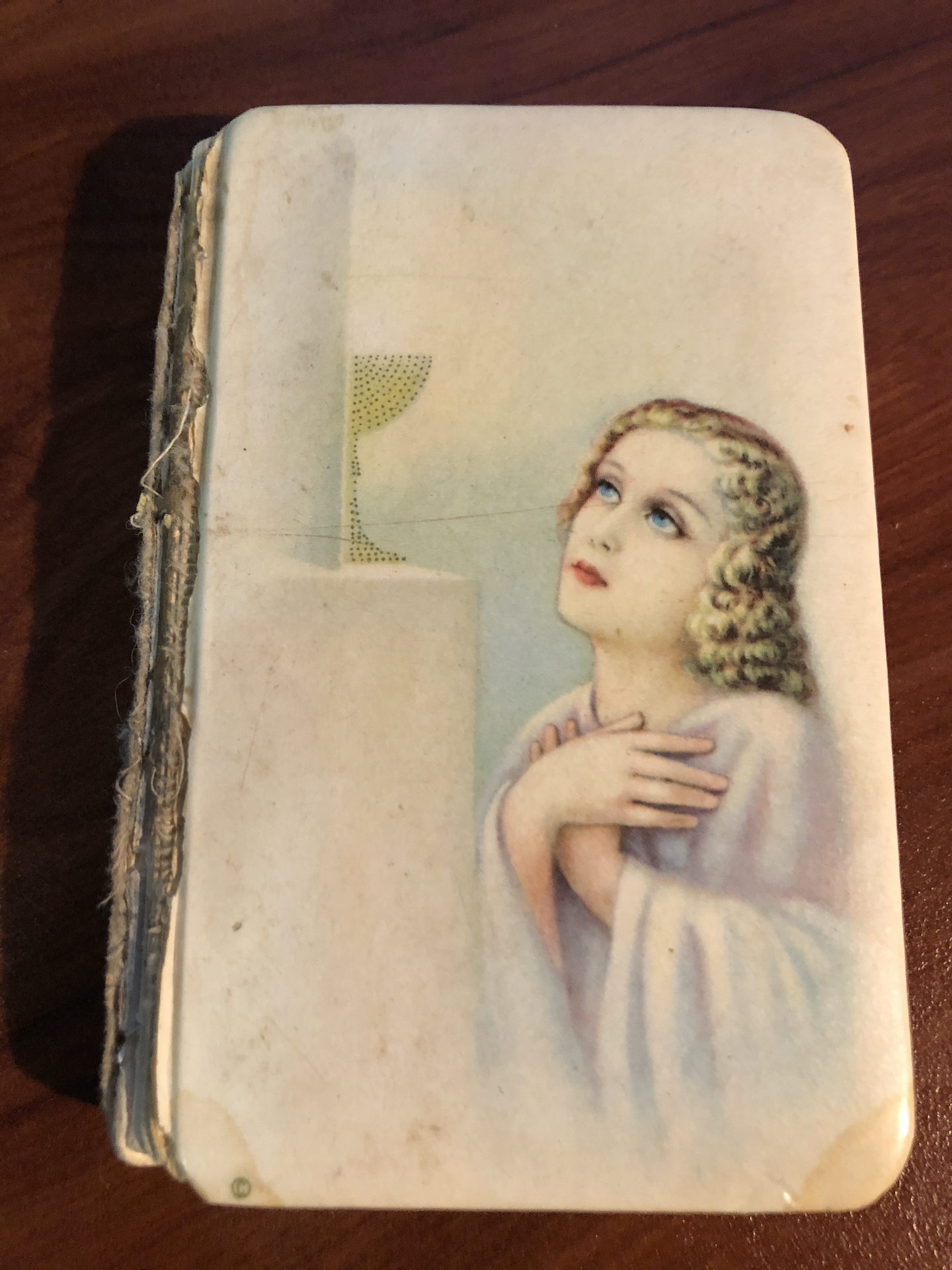The annual nightmare began each Ash Wednesday, when I found myself another year further into the darkness of adolescence and agnosticism. Was it getting smeared with ashes that I dreaded, or was it the upcoming extra hours in this huge, stale box? I’d trudge up the aisle in between my parents (did they think I’d try to escape if I was on either edge of them?) and the priest said something–I forget what–and smeared a cross of ashes on my forehead. I’d try to make eye contact with him, but he would already be focused on my father, behind me. I’d feel the clammy ashes on my forehead and all I’d think of was a zit. For sure I’ll get a zit.
Another bad thing about Ash Wednesday is that I’d have to go back to church that Friday and then that Sunday–three days in half a week. I wouldn’t have to go that often again until Holy Week, and at least then it was the home stretch. Fridays were the worst–the ritual I dreaded so much I always pretended to be sick for at least one of them. (I always limited my fake illnesses to maintain my credibility.) Worse than Mass, even worse than Confession—were the Stations of the Cross.
Every week on our way in I would ask: How many more Fridays? And they’d tell me. Five. Four. Finally one, but we have to go to church twice on that day, plus we have to be depressed because it’s the day He died. But at the first Stations of the Cross Friday it all comes back to me. What I’d blocked out for a year.
One of the things that makes it hard is the visual. The altar boys and priest start out at the first station, about eleven o’clock if the church is a clockface, and go counterclockwise till about one o’clock–stopping twelve times to read the stuff, wiggle the incense, whatever.
Twelve is a small number by the time you’re grown up. Twelve miles an hour, twelve dollars, twelve calories, twelve lovers in your history–none of these are big deals. Twelve days till Christmas, or till you turn a year older, are considered short periods of time. But to a kid, twelve is a lifetime. It felt like a year till the priest and his entourage got to the first station–and they had to get all the way around the church! I was missing all the late Friday afternoon reruns: Gilligan’s Island, Bewitched, Get Smart. And I had to stand and kneel and genuflect each of those twelve times.
I felt like I’d explode. I imagined ascending like Christ did, only through the gold tabernacle floating through the sky to my safe suburban home. (“Was it real gold?” I’d always whisper to my mother. “Shhh!” she’d say.) It wouldn’t have worked, though. Because in each room of our house there was a crucifix with the old dried palms tucked in, sisters of those sacrificed so I could get ash-zits on my forehead. In every room there was a totem of guilt.
When I was nine I announced at the dinner table that I was going to be a nun. My mother looked worried, which seemed strange since she was such an ardent fan of the religion. My brother laughed sarcastically and said–I still remember his exact words–”Carolyn, if you become a nun I’ll buy you a ruby-studded rosary.”
That was extra motivation, and soon I was kneeling for thirty minutes a night on my little quilted pillow, praying up to my crucifix. I owe it to Lent for curing me. Six weeks of the constant shuttle between home and church helped me realize there were more important things than rubies. Time and fresh air were two.
Years later I asked my brother why he’d been so sure that day that I wouldn’t be a nun. “I wasn’t,” he said, “But that’s what my big brother told me when I said I was going to be a priest.”
“Did Mom look worried then too?” I asked.
“Yep,” he said.
Another year has passed, and again it is Holy Week. I sit in the pew of St. Patrick’s Church, gaze into the stained glass windows I’ve long since memorized-the chalise surrounded by rays of light, the lamb, and the eucharist. It feels like I’ve lived in this church for the last five weeks. I am numb from the pretense of praying.
It starts on Ash Wednesday, when I am again besmudged with the ashes from last year’s palms. Every year I beg my mother to spare me. For some reason, the ritual humiliates me. That’s the point, she says, and up I go, in between Mom and Dad. As always, I try to make eye contact with the priest. As always, he’s looking behind me, at the approaching figure of my father.
Two days later the weekly ritual I most hate begins again. The Stations of the Cross. Each week an eternity passes as the priest and his altar boys go from the first station to the last, and we follow along in the paperback book. No songs. No celebration. Just purple and black, grief and shame. Kneeling, standing, kneeling, standing, in the weight of it all.
The confessionals loomed large in the back of the church.
Then Holy Week–four days of church in a row. Each day different from the conventional Mass, which makes it much harder to put my body and voice on autopilot and take my imagination to somewhere fertile. Holy Thursday’s service lasts hours, and Friday–which is cloudy and dark–lasts forever. Despite the layers of my apathy, I feel God’s death. My day goes into slow motion from twelve to three, and in my peripheral psychic vision I see Christ and his wounds. I can do nothing but turn away, like all his other children.
Then Holy Saturday. The beginning of the mystery: where is He? The expectation not just that my extra hours of church penance are almost over, but that soon the church will be filled with light. For us Catholics, it will officially be spring. My white patten leather shoes will be taken from the back of my closet, polished by my father at his work bench in the garage. My brother will wear his lemon yellow vest, my father his peach tie. We will celebrate all day, and then no church for a whole wonderful week.
Easter morning. The church is filled with irises and gladiolas. Throughout the congregation there is a sense of relief from the rigors of Catholicism. No more fish on Fridays, no more twice a day pilgrimages to pray for forgiveness. Just light and joy. Finally song fills the church. The priest wears white and even children who hate each other manage to shake hands, really feel love for one brief moment, before the grief and guilt begin to build again.

